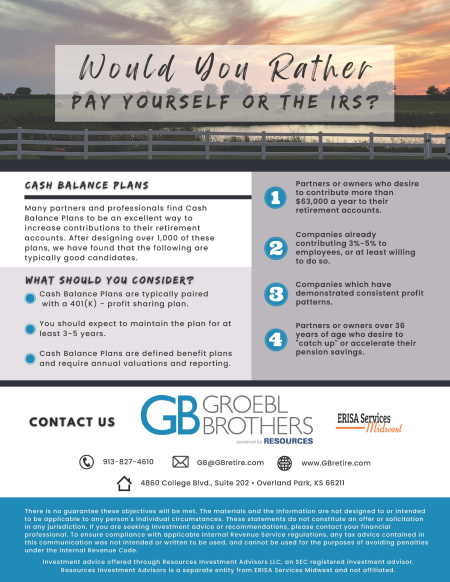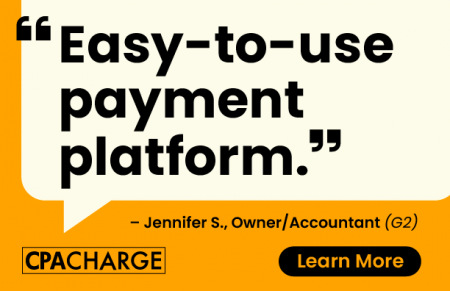
March 14, 2023
Cash balance plans help business owners fund and deduct very large employer contributions. These plans allow employers to contribute significantly more than they can with a typical 401(k) plan. They are also a great way to reduce the company tax burden. Cash Balance plans allow business owners to make up for lost time related to their retirement savings and are a good option for those who might need to catch up on retirement plan savings.
Often referred to as a “hybrid” plan, cash balance plans are a type of defined benefit plan that act like a defined contribution plan. This means cash balance plans can be paid out as a lifetime annuity or a lump sum. In these plans, employees do not make contributions. The employer makes an annual deductible business contribution on behalf of employees, as a percentage of pay or flat dollar amount with guaranteed interest. Cash balance plans are typically set up to heavily benefit the owners or other specified employees. They can also be established with companies that already have an existing 401(k) or profit-sharing plan. When this is done, it is usually referred to as a “combo” plan.
Who are the best candidates for a cash balance plan?
Cash balance plans can be a good fit for companies with or without employees. They typically work best for companies with consistent profitability when an owner’s reportable compensation is significantly higher than their employees as well as having age disparity between the owners and employees. It’s also important that the company be willing to keep the plan long-term, at least three to five years. Cash balance plans are not a good option if an employer only wants the plan for a couple of years.
Should a business adopt a cash balance plan?
If business owners have continually exhausted the limits inside of their 401k plan and/or the current plan’s IRS limits, have consistent profits year after year, and want to reduce their current employer tax liability, a cash balance plan addition might be a great fit. These factors make cash balance plans a popular retirement plan option. This is especially the case with small, high-earning businesses of any type and professional service organizations (doctors, attorneys, etc.) who can shelter large sums of assets in this type of plan and are provided Federal protection from bankruptcy or garnishment from creditors.
When should you consider adopting a cash balance plan?
The Secure Act made it possible for business owners to retroactively adopt a new qualified plan, such as a profit sharing, defined benefit, or cash balance plan, after the close of the plan year.
Much like implementing a SEP retroactively, this means that employers now have until the due date of the business’s tax return, including extensions, to establish a cash balance plan. The tax filing deadline varies based on the employer’s business entity type and corporate year end.
For example, if an S-Corp or C-Corp entity would like to establish a cash balance plan for the 2022 calendar year, they can establish a plan and contribute to a new cash balance plan by September 15, 2023, if their business tax return was extended. Of course, the TPA firm creating the plan would require time to calculate the contribution options and draft the legal plan document, typically a month or two before the deadline.
In Summary
In today’s business world and ever-changing landscape for business owners, the ability to defer current day taxes while building up a retirement nest egg is essential to their long-term goals and objectives. Because 401k plans only allow for a finite amount to be contributed each year, the Cash Balance plan offers business owners an alternative for higher savings rates while maintaining a decent amount of flexibility while lowering their tax liability sometimes substantially from year to year. Because Cash Balance plans do require a level of permanency, it is especially important that business owners work with their CPA and Pension Consultant to determine how a Cash Balance plan might work into the overall business and tax plan of the business.
 |
Stay tuned...Later this summer, KSCPA will provide a 1-hr FREE CPE Virtual Expert Forum by the Groebl Brothers to outline the details of cash balance plans and answer questions. In the meantime, feel free to utilize this 1-pager to explain the benefits of cash balance plans to your clients. |
|
 |
Joe Groebl Joe began his career in the financial services industry as an intern with Paine Webber in the summer of 1991. Two years later he moved to Smith Barney where he served for 17 years. In 2010, Joe broke away from Wall Street to join an independent platform so he could offer fiduciary client services and autonomous advice. I believe all financial advisors should be direct fiduciaries to their clients and soon this will be an industry standard. In 2009 Joe brought his brother Tim Groebl into his business to become his trusted partner. |
 |
Tim Groebl Since 2010, Tim has focused much of his time specializing on our investment process and in the Department of Labor’s new rules and regulations with ERISA guidelines. Previous to joining his brother, Tim worked as an Insurance agent at AAA. Together and as Professional Plan Consultants, Joe and Tim are able to provide a state of the art investment process that includes a client friendly written out Roadmap. Our goal is to help people utilize the Capital Markets and manage expectations. Nobody knows the future or can control it but we can manage the risk. We educate folks so they can understand the volatility associated with the reward they are seeking. In short we help take the surprise effect out of long term investing. |
The Ignite blog is an official publication of the Kansas Society of CPAs, Copyright 2023.
THANK YOU TO OUR SPONSORS & PARTNERS IN ACCOUNTING EXCELLENCE!
 |
 |
Would you like to showcase your business by sponsoring the Ignite blog? Click here for more information.
© Copyright 2025 KSCPA | All Rights Reserved